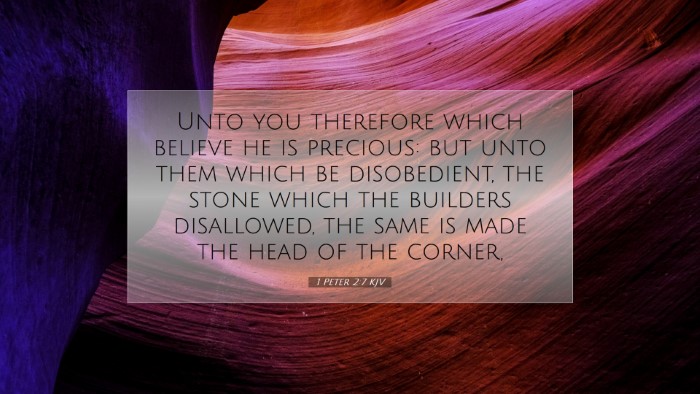Commentary on 1 Peter 2:7
Verse Reference: 1 Peter 2:7 - "Unto you therefore which believe he is precious: but unto them which be disobedient, the stone which the builders disallowed, the same is made the head of the corner."
Introduction
This verse serves as a pivotal statement in the epistle of 1 Peter, distinguishing between the responses to Christ as the cornerstone. It reveals the belief of the faithful versus the rejection by the disobedient. This commentary will draw insights from public domain commentaries, particularly from Matthew Henry, Albert Barnes, and Adam Clarke, providing a rich theological understanding for pastors, students, theologians, and Bible scholars.
Understanding the Text
The central theme in this verse is the contrast between believers and non-believers in relation to Christ, symbolized as a precious stone. The usage of "precious" implies immense value and honor attributed to Christ by those who have faith.
Believers: The Preciousness of Christ
- Matthew Henry's Perspective: Henry emphasizes the cherished relationship believers have with Christ, describing Him as the cornerstone of faith, where those who believe find strength and stability. He elucidates that faith unveils Christ’s beauty and worth.
- Albert Barnes Commentary: Barnes expounds that the concept of “He is precious” suggests not only the intrinsic worth of Christ but also the transformative impact He has on believers' lives. He argues that this belief makes believers 'living stones' in the spiritual house of God.
- Adam Clarke’s Insight: Clarke references a metaphorical interpretation of Christ as the chief cornerstone, essential to the structure of their faith and community. He highlights that the believers’ acknowledgment of Christ’s value comes from an experiential knowledge of His grace and salvation.
Disobedient: Rejection of Christ
- Matthew Henry's Insight: Henry states that the "disobedient" symbolize those who reject the gospel. He highlights that their disbelief leads to a fatal oversight—they cannot perceive the cornerstone's significance and hence are left without foundation.
- Albert Barnes’ Thoughts: Barnes notes that the "stone which the builders disallowed" reflects the Jewish leaders' rejection of Christ. He indicates that this rejection fulfills prophecy and establishes the contrast with the faith of believers who embrace Christ's lordship.
- Adam Clarke’s Commentary: Clarke elaborates on the phrase "the builders disallowed," detailing its implications regarding the spiritual blindness of those who oppose Christ. He suggests that this rejection not only signifies failure in recognizing true leadership but also culminates in a lack of salvation.
Theological Implications
This verse illustrates profound theological themes relevant for doctrinal teaching and preaching. It presents the duality of faith and rejection, challenging readers to consider their stance concerning Christ.
The Value of Christ
Believers are invited to recognize and proclaim the worth of Christ as their cornerstone. Acknowledging the splendor of Christ as precious is central to the Christian faith. When believers elevate Christ, they position themselves within the "spiritual house" being built by God.
The Consequences of Disbelief
This verse serves as a sobering reminder of the consequences that accompany rejection of Christ. The term "disobedient" illustrates a deliberate choice against divine truth, positioning individuals outside the covenant community. The prophetic implications of Christ as the foundational stone invoke serious reflection on the importance of faith.
Practical Applications for Believers
- Faith Affirmation: This passage serves as a clarion call for believers to reaffirm their faith in Christ’s preciousness. It invites personal reflection on whether Christ holds the primary position in their lives.
- Outreach and Evangelism: Understanding the fate of the disobedient encourages believers to reach out to the unconverted, with a sense of urgency and love, knowing that rejection of Christ leads to spiritual peril.
- Community Building: Recognizing believers as 'living stones' emphasizes the importance of community within the body of Christ. Churches are encouraged to foster environments where faith is nurtured and Christ is exalted.
Conclusion
In conclusion, 1 Peter 2:7 encapsulates the essence of faith in Christ amidst a world that often rejects Him. The insights drawn from Matthew Henry, Albert Barnes, and Adam Clarke enrich the understanding of this verse, highlighting the dichotomy of belief and unbelief, and the implications they hold for individuals and the church collectively. As Christians seek to understand their identity in relation to Christ, this verse serves as both encouragement and admonition—Christ is indeed precious to those who believe, and incalculable loss awaits those who reject Him.


